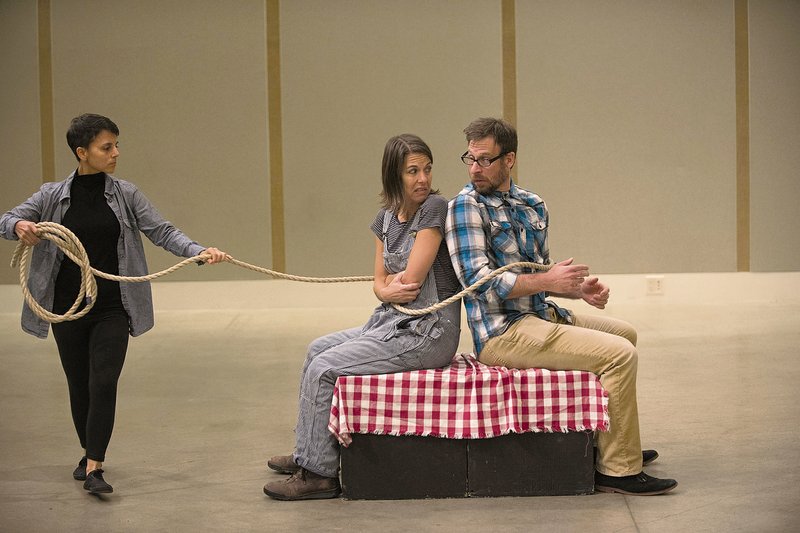You may think it's impossible to write a witty, dark comedy that revolves around a post-apocalyptic world where cannibalism is the only means of survival.
Playwright John Walch, head of the University of Arkansas' Playwriting Program, will prove you wrong.
FAQ
‘Craving Gravy’
WHEN — 7 p.m. Sunday
WHERE — 21c Museum Hotel in Bentonville
COST — Ssuggested donation of $3
INFO — www.facebook.com/Ar…
His play, "Craving Gravy -- or, Love in the Time of Cannibalism" is being performed in a staged reading by Arkansas Staged at 7 p.m. Sunday at the 21c Museum Hotel in Bentonville.
Walch says the play was inspired by a chance encounter with a rope on a beach many years ago.
"It really started with the image of a rope twisting into the center of the earth," says Walch. "I encountered such an item on a beach in Mexico in my ill-spent youth, and I recalled pulling on it and pulling on it with friends and maybe a little too much tequila. We were young, and we began to conjure all manner of things that it might be attached to ... and so when it came time to write a play, I started with that image and just kept pulling."
In the play, characters Delroy and Gilroy find just such a rope and work together to find out what's at the end of it.
"At its core, the play is about human connection, the need for it for our survival," says Walch. "There's a line in the play that particularly rang pure to me. It comes at a point when two characters are bound together: 'We're bound together! Every move you make makes me uncomfortable!'
"The idea that we are bound together, like it or not, in this country, rings very true to me at this particular point [in our history], and everything you do affects me in some way. Are we going to struggle on our own, no matter the way it affects the other, or are we going to be recalled to our founders' ideals of 'E pluribus unum': 'Out of many one'?"
Director Shana Gold says that the setting of the 21c Museum Hotel is ideal for the subject matter of the play.
"It's a really good choice for doing [the play] in a site specific way, because it really will benefit from being in an unusual setting," says Gold. "Because it's such an unusual play, it doesn't really need to be in a theater as much. It actually will be kind of cool for it to be able to travel though space a little bit and benefit from the unusual setting of [a] gallery that kind of has the post-modern setting. The remnants of pop culture are supposed to be scattered around, and, in a theater, that would probably be hard to accomplish as effectively as it's going to be in the gallery, because it's already all there.
"The 21c Museum Hotel is just such a cool space -- I mention it to people, and they say, 'No, I've heard of it, but I've never been,' so it's kind of a perfect synergy for people who have never been able to get an opportunity to see the incredible work that's there. It's world-class contemporary art -- and they also get to hear the work of the new head of the playwriting department of the University of Arkansas."
ArkansasStaged artistic director Laura Shatkus says that the company's performances defy audience expectations of a "staged reading."
"Each reading we've produced has included one or two theatrical elements not normally found in a typical 'staged reading,'" says Shatkus. "For example, for the upcoming reading on October 2nd, we are excited to be partnering with two designers, Shawn Irish, who will design some projection and lighting elements for the show, and Rebecca Ivey, a musician who is creating soundscapes though her violin.
"I think you'll find that our 'readings' are just a hair's breadth away from what you would consider a play in the traditional sense."
Despite the dark themes, Walch says that when looking at the play now, 20 years after he wrote it, he sees sweetness at the center. "It's oddly sweeter [now] than it was to me then. When I wrote the play, I don't think I had truly lost someone.
"The fragility of the friendships and relationships we make during our time here really comes through to me more now."
NAN What's Up on 09/30/2016
